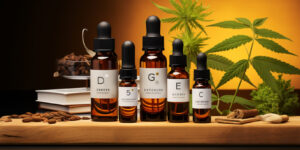The integration of cannabidiol, or CBD, into sports recovery routines is generating growing interest among athletes and fitness enthusiasts. While its potential benefits for muscle relaxation and stress management are widely discussed, a recurring question remains: is smoking CBD after exercise truly beneficial? This article explores this controversial practice in depth, focusing on its possible effects on health and performance. The Potential Benefits of CBD for Sports RecoveryCBD is known to relieve muscle and joint pain, common ailments among athletes, particularly after intense physical exertion. By acting on certain receptors in the endocannabinoid system, it may help reduce inflammation and accelerate muscle regeneration. These properties make it a potential ally in improving the quality of post-workout recovery. For more information on how CBD can help reduce inflammation and relieve pain, you can read this article on the benefits of CBD for athletes. Additionally, using CBD may also help improve sleep quality, which is essential for any athletic activity. Adequate rest allows the body to rebuild muscle fibers and prepare for future efforts. Some studies suggest that CBD promotes restful sleep without the side effects associated with traditional sleep aids. Muscle Relaxation and Reduced Inflammation According to several studies, CBD may offer muscle relaxation. CBD can significantly reduce muscle soreness after exercise. This phenomenon is particularly beneficial for those involved in intense activities such as bodybuilding or endurance sports. Furthermore, its supposed ability to modulate the body’s inflammatory response plays a key role in reducing muscle soreness. This is particularly important for sports such as MMA, where rapid recovery is essential. Learn more about this topic by exploring the specific benefits of CBD for MMA athletes. Here are some potential benefits for athletes using CBD for recovery: Reduction in chronic and acute pain. Rapid reduction in post-exercise inflammation. General support for the immune system thanks to its antioxidant properties. Can we talk about improved athletic performance? The idea that CBD can improve athletic performance remains widely debated. Although it doesn’t act as a direct stimulant, its influence on stress management and anxiety reduction can indirectly boost concentration and motivation, essential components for athletic performance. Thus, in a competitive environment, being mentally relaxed and focused is a considerable asset. Nevertheless, a closer look at current data clearly reveals that CBD should be viewed more as a recovery supplement than a pre-workout. Its impact on performance lies primarily in the optimal repair of body tissues and emotional regulation after strenuous physical exercise.
Sommaire
ToggleStress Management and Overall Well-Being
The anxiolytic effect of CBD is another aspect that attracts athletes. Effective stress management Before, during, and after a competition can make a significant difference in the final result. Therefore, including CBD as part of a sports routine focused on well-being and relaxation is of definite interest. By guiding its users toward a calming sensation, CBD contributes to better emotional regulation. This dimension is not only essential for experienced professionals but also for novices interested in serene sports practices. How to consume CBD for recovery? While smoking CBD after sports is a popular method, it’s important to consider different consumption options to maximize the benefits without compromising respiratory or cardiovascular health. Sublingual oils, capsules, or topical creams can offer similar results without the drawbacks of smoking.Each form has its own specificities regarding the speed and duration of the effects felt. While oils offer a fast-acting effect, capsules provide a sustained release, ideal for recovery spread over several hours. As for creams, they target specific areas that require immediate treatment, such as localized sore spots.
Why avoid smoking CBD directly? Some hesitation about combustion stems from the risks associated with the chemicals generated during the process, which can potentially negate the desired beneficial effects. Smoking CBD shares some similarities with traditional cigarettes, particularly in terms of lung irritation, which is hardly recommended for people looking to optimize their health. To protect their lung capacity, many consumers are evaluating safe and effective alternatives such as vaporizing.
, much less aggressive for the body. Furthermore, by opting for oral or cutaneous methods, they minimize the risks associated with repeated inhalations.
Comparison table: CBD consumption methods Method Advantages Disadvantages Smoking Fast effectsLung irritation, combustion risk
Vaporization Fast effect, less harmful than smoking Initial investment in vaporization equipment
- Sublingual (oils)
- Fast absorption, ease of use
- Sometimes unpleasant taste
Gelcaps
Slow release, discreet Delayed effect compared to other methods Topical (creams)
Specific target, localized relief Less effective for systemic disorders FAQs: CBD and post-exercise recovery
What are the best forms of CBD to use after exercise?
Sublingual oils and topical creams are often recommended for their direct effectiveness. They allow you to quickly target muscle or joint pain while avoiding the side effects associated with smoking. Other forms, such as capsules, have a prolonged release suitable for long-term recovery. Is smoking CBD safe after a workout?While smoking CBD can provide rapid effects, it carries risks for the respiratory tract. Irritants can be released during combustion, which is not ideal for those concerned about their general health. The safer alternative is to use non-inhaled products. How long after exercise is CBD effective? The effectiveness of CBD The dosage varies depending on the method of consumption. Generally, effects begin within a few minutes to a few hours of ingestion. For example, sublingual oils show almost immediate results, while capsules require a longer period of time. The persistence of effects also depends on the dosage used.
What is the optimal CBD dosage for post-workout recovery? Dosage depends largely on the individual, their body weight, and metabolism. A modest initial dose is often recommended, followed by a gradual increase until the desired effects are achieved. It is always wise to consult a healthcare professional for personalized recommendations.
Alexandre Lacarré is recognized as an innovative and influential leader in the cannabidiol (CBD) industry. Alexandre began his career in the biotechnology sector, where he gained valuable expertise in research and development. Passionate about the therapeutic potential of natural compounds, he quickly shifted his focus to the nascent CBD industry.



